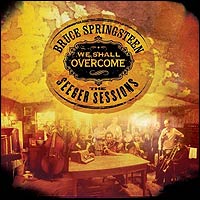Protest music takes a bow
The tune, recorded last year, is built on an uptempo pop-rock arrangement similar to Billy Joel's "We Didn't Start the Fire," over which the Right Brothers lay out a defense of Bush's foreign and economic policies ("Revenue is going up / can you say tax cuts?"), leading up to the titular chorus, "Bush was right!" And while they're at it, they include a roll call of shame:
Ted Kennedy -- wrong!
Cindy Sheehan -- wrong!
France -- wrong!
If the Right Brothers were recording "Bush Was Right" today, they'd probably expand their list of the wrong-minded. Pink, whose latest album includes a scathing folk song with the Indigo Girls called "Dear Mr. President," would probably be there. So would the Dixie Chicks, whose unrepentant attitude is summed up by a song title on their new album: "Not Ready to Make Nice." Or Jackson Browne, whose mid-'80s song "Lives in the Balance" has been turned into an updated video with images from the war in Iraq (www.informationclearinghouse.info/article11924.htm).
But the two names most likely to be there are Neil Young and Pearl Jam, whose latest albums take dead aim at the Bush administration: Young's "Living With War" on Reprise Records and Pearl Jam's eponymous release on J Records.
The coincidence of the albums' releases brings to mind Neil Young's stellar 1995 album, "Mirror Ball," which featured Pearl Jam. The link to the new releases isn't a matter of politics but quality. Since "Mirror Ball," both acts have had periods where they seemed to lose the thread.
Young's music got flabby and unfocused on 1996's "Broken Arrow." He sounded complacent on 2000's "Silver & Gold" and deadly dull on 2002's undercooked "Are You Passionate?" Signs of life returned with 2003's rough-hewn "Greendale" and last year's soft-spoken "Prairie Wind," made under the shadow of Young's near-death from an aneurysm. But that left fans wondering whether the 60-year-old Young had much rock left in the tank.
Pearl Jam, meanwhile, spent the mid-1990s locked in an ugly spat with Ticketmaster, which limited its touring for years. A series of increasingly dense, difficult albums further shrank the band's audience. By the turn of the century, Pearl Jam had evolved into a grunge equivalent of the Grateful Dead -- playing to a large cult audience, but increasingly irrelevant to the mainstream.
Now, both Young and Pearl Jam have regained their sense of purpose. Part of the energy comes from current events, but part of it comes from reconnecting with the rock-first-and-think-later immediacy that made both acts great in the first place.
'Metal folk protest'
Young recently told Rolling Stone that one of the inspirations for "Living With War" came in late March, when he saw a USA Today photo of a military cargo plane that had been turned into a flying hospital. The photo's publication followed a strong nudge earlier that month at South by Southwest, the music-industry convention in Austin, Texas.
Young served as keynote speaker to promote his new concert movie, "Heart of Gold." South by Southwest managing director Roland Swenson, making the introduction, declared, "We need another 'Ohio,' " a reference to Young's Vietnam War-era protest song about the 1970 shootings at Kent State University.
Six weeks later, "Living With War" was in stores.
"I didn't mean to put him on the spot," Swenson says now. "I was just trying to talk about why I admired him and to show how powerful music can be. Then, after it was over, I was kind of freaking out: 'Oh my gosh, I just challenged Neil Young. What was I thinking?' But here it is, although I don't want to take any credit and I certainly don't deserve any."
Young describes "Living With War" as "metal folk protest." Packaged in a plain brown wrapper, "Living With War" seems less like a record than a collection of protest songs to chant at a rally. As such, it will probably have the shelf life of a "Daily Show" episode. But rushing the album was definitely the right thing to do.
"Living With War" plays out as a Pete Seeger-style sing-along, set to Young's electric-guitar squall and cheesy trumpet (credited to the aptly named Tommy Bray). Throw in a 100-voice choir and presto: Kumbaya.
Young doesn't do that song, or "We Shall Overcome." But "Living With War" does close with an a cappella version of "America the Beautiful." The effect is similar to "The Deer Hunter," director Michael Cimino's wrenching 1979 Vietnam film, which closed with the cast singing "God Bless America." It sounds a note of reconciliation, holding out hope for better times ahead.
First, though, we have to get through the present. "After the Garden" opens "Living With War" with, "Won't need no shadow man / Runnin' the government / Won't need no stinkin' war." "Shock and Awe" describes the Iraq war as a hopeless quagmire with no winners. And "Flags of Freedom" has the unforgettable image of a young man marching off to war as his sister watches, wearing headphones, "Listenin' to Bob Dylan singin' in 1963."
The song getting the most attention is "Let's Impeach the President." It has a feel similar to 1979's "Powderfinger," in which Young described being a combat casualty with heartbreaking pathos ("Then I saw black / And my face splashed in the sky"). But where "Powderfinger" was reportorial, "Let's Impeach the President" aims to provoke. It starts off with a trumpet playing Taps and concludes with sound bites of President Bush as the choir chants, "Flip flop."
No surprise that Fox News attacked "Let's Impeach the President" before the song was even available. Writing on the Fox Web site last month, commentator John Gibson said of Young and Pink, "They are forgetful. They have amnesia. They blame the wrong leaders. They are proud of their opposition. And they couldn't be more wrong."
Rock the mainstream
A self-titled album implies an attempted rejuvenation, and "Pearl Jam" accomplishes that feat. The album even got Pearl Jam back on "Saturday Night Live" for the first time since 1994, an April 15 performance most notable in that lead singer Eddie Vedder looked and sounded as though the last 12 years had never happened.
After years of half-successful tangents, "Pearl Jam" is the group's attempt to reclaim the center by rocking the house. It's the band's equivalent of U2's "All That You Can't Leave Behind," a back-to-basics move that should remind everyone why Pearl Jam was worth paying attention to in the first place.
Although not as politically direct as Young's album, "Pearl Jam" fires plenty of salvos at the Bush administration. "World Wide Suicide" speaks of a dead soldier, "A handsome face that the president took for granted / Writing checks that others pay." "Army Reserve" evokes the families of troops serving in Iraq, and "Marker in the Sand" decries those who are "killing in God's name."
Apart from a few quieter numbers, most of the 13 songs are terrific riff-rock that would have fit right in on "Ten" or "Vs.," the twin peaks of Pearl Jam's early-'90s dominance. Perhaps more important, the album has put Pearl Jam back into the center of the cultural conversation at a time when the band's political views seem more mainstream by the day.
"Pearl Jam" has been noncontroversial enough for Vedder to throw out the first pitch and sing "Take Me Out to the Ballgame" at a Cubs baseball game in Chicago last weekend. One of Pearl Jam's few appearances on the opinion pages this year was a relatively flattering mention in the comic strip "Doonesbury." Told that she can spend the summer following Pearl Jam on tour, teenage Alex Doonesbury gushes, "Why, yes! And they've stopped sucking! Perfect!"
Perfect, yes.







